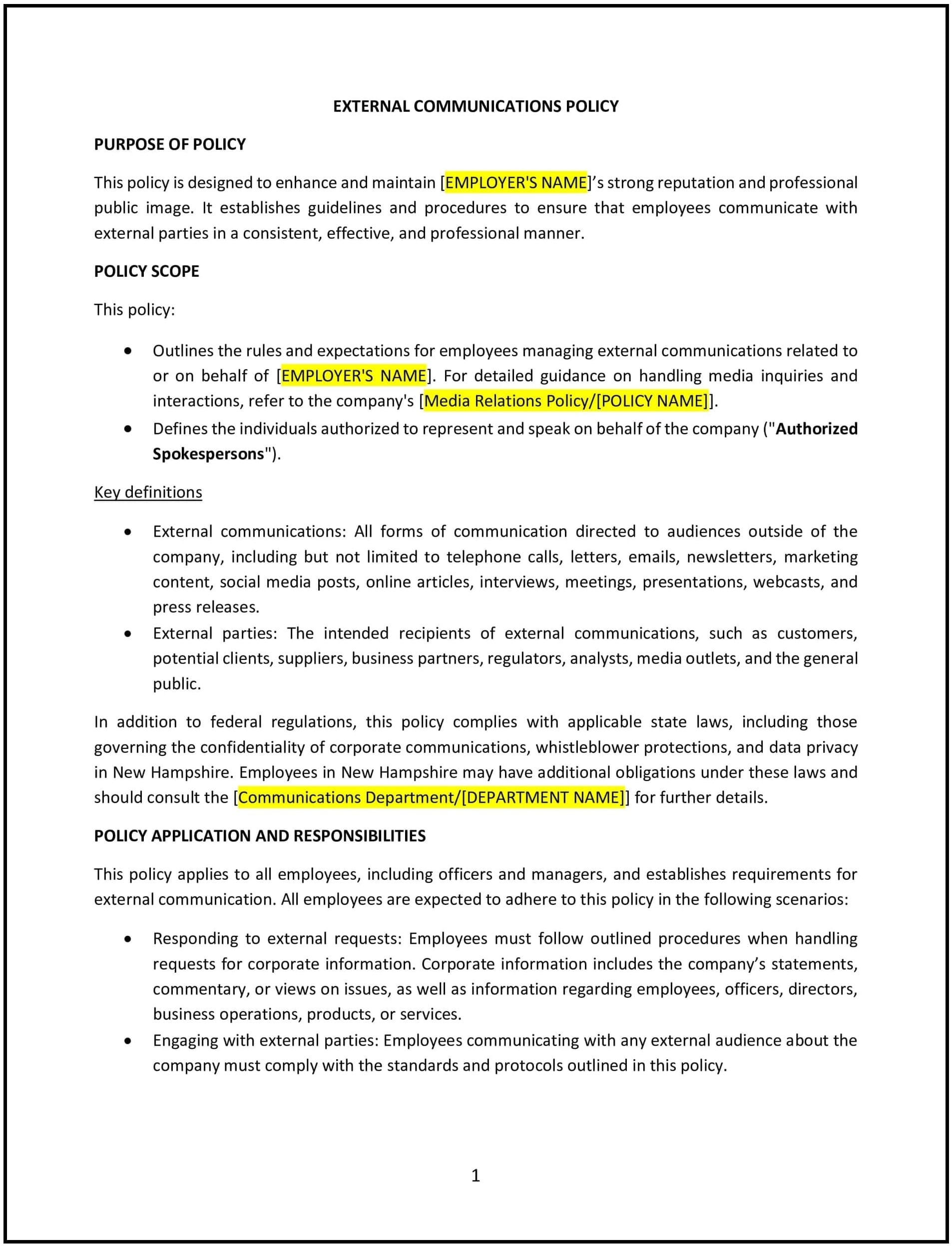External communications policy (New Hampshire): Free template
Got contracts to review? While you're here for policies, let Cobrief make contract review effortless—start your free review now.

Customize this template for free
External communications policy (New Hampshire)
An external communications policy helps New Hampshire businesses manage and control how they communicate with the public, including clients, customers, media, and other external stakeholders. This policy outlines the company's approach to sharing information, ensuring that communications are clear, consistent, and aligned with business objectives.
By adopting this policy, businesses in New Hampshire can protect their brand reputation, prevent misinformation, and maintain consistent messaging across all external channels.
How to use this external communications policy (New Hampshire)
- Define communication channels: Clearly specify the methods of communication, such as press releases, social media, company website, emails, and public statements, and outline who is authorized to speak on behalf of the business through these channels.
- Identify authorized spokespeople: Designate the individuals or departments responsible for communicating with external stakeholders, such as the CEO, public relations team, or marketing department, and specify when others may be authorized to speak on behalf of the business.
- Maintain consistency: Ensure that all external communications align with the company’s values, goals, and messaging. This includes maintaining a consistent tone and style in all communications and addressing any internal discrepancies in messaging.
- Set guidelines for social media: Outline specific expectations and guidelines for employees engaging on social media platforms, emphasizing the importance of professional conduct and confidentiality when discussing company-related matters.
- Establish media interaction protocols: Provide clear guidelines for interacting with the media, including how to respond to media inquiries, how to handle interviews, and the process for issuing statements or press releases.
- Address crisis communication: Develop protocols for managing communication during crises or negative events, including how to respond to unexpected situations and who will manage crisis communication efforts.
- Ensure transparency: Encourage transparency in communications while respecting confidentiality and legal obligations. Clarify the process for sharing information and how to handle sensitive matters that may affect the business or stakeholders.
- Review and update: Regularly review the policy to reflect changes in business practices, New Hampshire regulations, or communication technologies, and update it to maintain its effectiveness.
Benefits of using this external communications policy (New Hampshire)
This policy provides several benefits for New Hampshire businesses:
- Protects company reputation: By controlling external communications, businesses can ensure that their public messaging is professional, accurate, and consistent, which helps maintain their brand integrity.
- Increases clarity: A clear communications policy ensures that employees understand how to handle public communications, reducing the risk of confusion, misinformation, or inconsistent messages.
- Fosters stakeholder trust: Transparent and consistent communication helps build trust with customers, clients, partners, and other stakeholders, contributing to stronger relationships and loyalty.
- Enhances crisis management: A well-structured crisis communication plan helps businesses navigate difficult situations more effectively, minimizing potential damage to the company’s reputation.
- Reduces legal risks: By adhering to company policies and legal guidelines, businesses can minimize the risk of legal issues arising from improper or unauthorized disclosures.
Tips for using this external communications policy (New Hampshire)
- Communicate the policy clearly: Ensure all employees understand the policy, including who is authorized to speak on behalf of the company and how to handle public communications.
- Provide media training: Offer training for authorized spokespeople on how to interact with the media and respond to inquiries, ensuring that communications are clear, accurate, and aligned with company messaging.
- Monitor communication channels: Regularly review external communications to ensure consistency and accuracy. Use social media monitoring tools to track public sentiment and respond to comments or issues promptly.
- Stay updated on regulations: Keep up to date with New Hampshire state laws, federal regulations, and industry-specific guidelines related to external communications to ensure compliance and effective communication practices.
- Prepare for crises: Ensure that all employees understand the company’s crisis communication plan and are prepared to act swiftly and professionally if a crisis occurs.